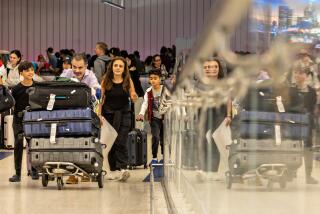Making Security Smarter
- Share via
Transportation Secretary Norman Y. Mineta installed federal security directors at nine U.S. airports Tuesday, including David M. Stone at Los Angeles International and Richard R. Baker at Ontario International. Stone, an admiral and one of the Navy’s top anti-terrorism experts, and Baker, a 20-year FBI veteran, are experienced security professionals. They’re sorely needed in a new Transportation Security Administration that isn’t doing much better than the slapdash private system it succeeded.
A federal study released this week showed that baggage screeners failed to detect 41% of concealed dummy weapons at LAX. The numbers were only slightly better at Ontario. As an official at the security agency told The Times on Monday, “It’s still the same [flawed security], it’s just costing a lot more money”--$2.4 billion this year alone for the agency, not to mention $100 million that LAX officials have spent studying how to modernize. Though the $9.6-billion plan that Mayor James K. Hahn made public Tuesday puts aviation security out front, construction won’t start for years.
Airlines, federal officials and aviation experts increasingly agree that the most cost- effective step would be to put less emphasis on poorly thought-out random searches--confiscating a grandmother’s manicure kit, rummaging through underwear in a pilot’s bag, even searching the person and luggage of former Vice President Al Gore--twice--on a recent Midwestern trip.
Instead, experts agree, aviation security efforts should focus more on improving computerized passenger profiling systems like those long used successfully in Israel. That means more intensive attention to a smaller number of travelers. The profiling system looks for anomalies in a traveler’s itinerary, finances and personal profile--not, as is commonly assumed, at race or ethnicity.
In recent congressional testimony, an El Al Airlines official told of the questioning of a young pregnant woman in 1986. The woman revealed that she had only $75 but planned to stay at one of Israel’s most expensive hotels. Since her story didn’t add up, screeners reexamined her baggage, which an X-ray had cleared. They found 7 pounds of explosives in the lining.
The good news is that some federal officials seem to understand what’s needed. As Homeland Security Director Tom Ridge recently put it, summarizing the challenge to federal aviation security, “We need to bring the same kind of attention to people at our airports as we do to [scanning for] ... weapons.”
More to Read
Sign up for Essential California
The most important California stories and recommendations in your inbox every morning.
You may occasionally receive promotional content from the Los Angeles Times.













